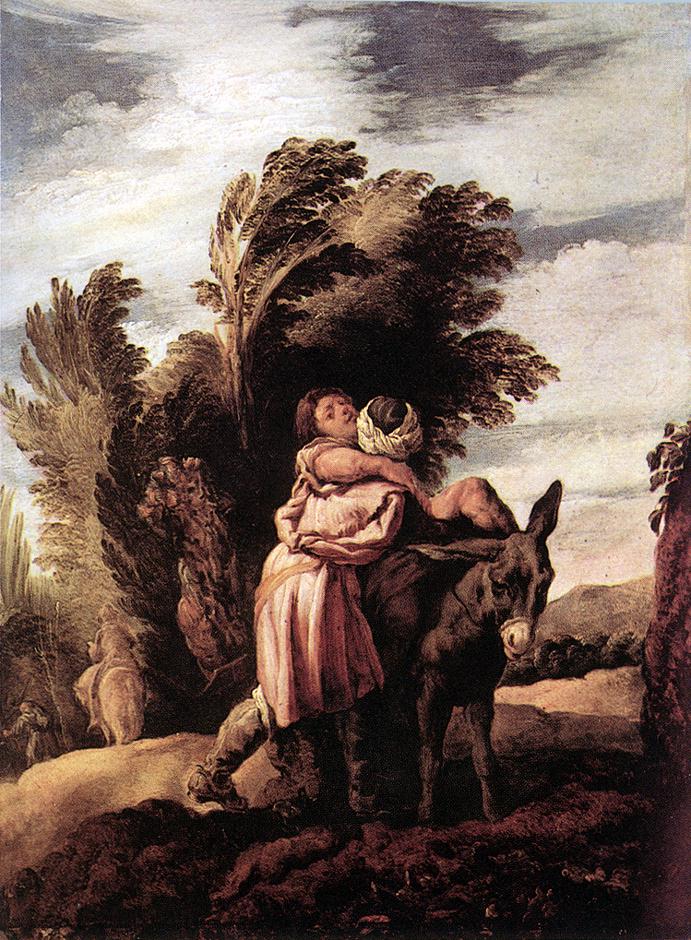
Parable of the Good Samaritan
Domenico Feti
c. 1623
Oil an canvas, 61 x 45 cm
Gallerie dell'Accademia, Venice
| Lk 10:25-37 | ||
|---|---|---|
| # | Douay-Rheims | Vulgate |
| 25 | And behold a certain lawyer stood up, tempting him and saying, Master, what must I do to possess eternal life? | et ecce quidam legis peritus surrexit temptans illum et dicens magister quid faciendo vitam aeternam possidebo |
| 26 | But he said to him: What is written in the law? How readest thou? | at ille dixit ad eum in lege quid scriptum est quomodo legis |
| 27 | He answering, said: Thou shalt love the Lord thy God with thy whole heart and with thy whole soul and with all thy strength and with all thy mind: and thy neighbour as thyself. | ille respondens dixit diliges Dominum Deum tuum ex toto corde tuo et ex tota anima tua et ex omnibus viribus tuis et ex omni mente tua et proximum tuum sicut te ipsum |
| 28 | And he said to him: Thou hast answered right. This do: and thou shalt live. | dixitque illi recte respondisti hoc fac et vives |
| 29 | But he willing to justify himself, said to Jesus: And who is my neighbour? | ille autem volens iustificare se ipsum dixit ad Iesum et quis est meus proximus |
| 30 | And Jesus answering, said: A certain man went down from Jerusalem to Jericho and fell among robbers, who also stripped him and having wounded him went away, leaving him half dead. | suscipiens autem Iesus dixit homo quidam descendebat ab Hierusalem in Hiericho et incidit in latrones qui etiam despoliaverunt eum et plagis inpositis abierunt semivivo relicto |
| 31 | And it chanced, that a certain priest went down the same way: and seeing him, passed by. | accidit autem ut sacerdos quidam descenderet eadem via et viso illo praeterivit |
| 32 | In like manner also a Levite, when he was near the place and saw him, passed by. | similiter et Levita cum esset secus locum et videret eum pertransiit |
| 33 | But a certain Samaritan, being on his journey, came near him: and seeing him, was moved with compassion: | Samaritanus autem quidam iter faciens venit secus eum et videns eum misericordia motus est |
| 34 | And going up to him, bound up his wounds, pouring in oil and wine: and setting him upon his own beast, brought him to an inn and took care of him. | et adpropians alligavit vulnera eius infundens oleum et vinum et inponens illum in iumentum suum duxit in stabulum et curam eius egit |
| 35 | And the next day he took out two pence and gave to the host and said: Take care of him; and whatsoever thou shalt spend over and above, I, at my return, will repay thee. | et altera die protulit duos denarios et dedit stabulario et ait curam illius habe et quodcumque supererogaveris ego cum rediero reddam tibi |
| 36 | Which of these three, in thy opinion, was neighbour to him that fell among the robbers? | quis horum trium videtur tibi proximus fuisse illi qui incidit in latrones |
| 37 | But he said: He that shewed mercy to him. And Jesus said to him: Go, and do thou in like manner. | at ille dixit qui fecit misericordiam in illum et ait illi Iesus vade et tu fac similiter |

Several aspects of the Good Samaritan story make his a type of Christ and explain the relationship between Christ, the mankind, and the Church.
Jerusalem and Jericho are placed at different levels in the story. The victim, the priest and the levite are described going down from Jerusalem, to the place of sin, which Jericho was. This is consistent with the abandonment of the call to sanctity initially given the nation of Israel.
The victim is wounded, but not dead, consistent with the Catholic teaching of the Original sin, which has left us wounded, but not dead -- not utterly depraved and still capable of good.
The Samaritan pours oil and wine with which he helps the victim, indicating the sacraments of the Church. He leaves for Jerusalem, the Heavenly city, but, like Christ, promises to return. He leaves a deposit -- two coins, traditionally understood as the two testaments of the Bible.
The innkeeper, a type of Church, is instructed to take care fo the victim, till his Savior returns. It is interesting that it is anticipated that the inn will spend more than the Samaritan has deposited, indicating that the Church of Christ will have to add her own effort to the deposit of faith left by Christ. The Treasure of Merits theology can be seen in this parable.